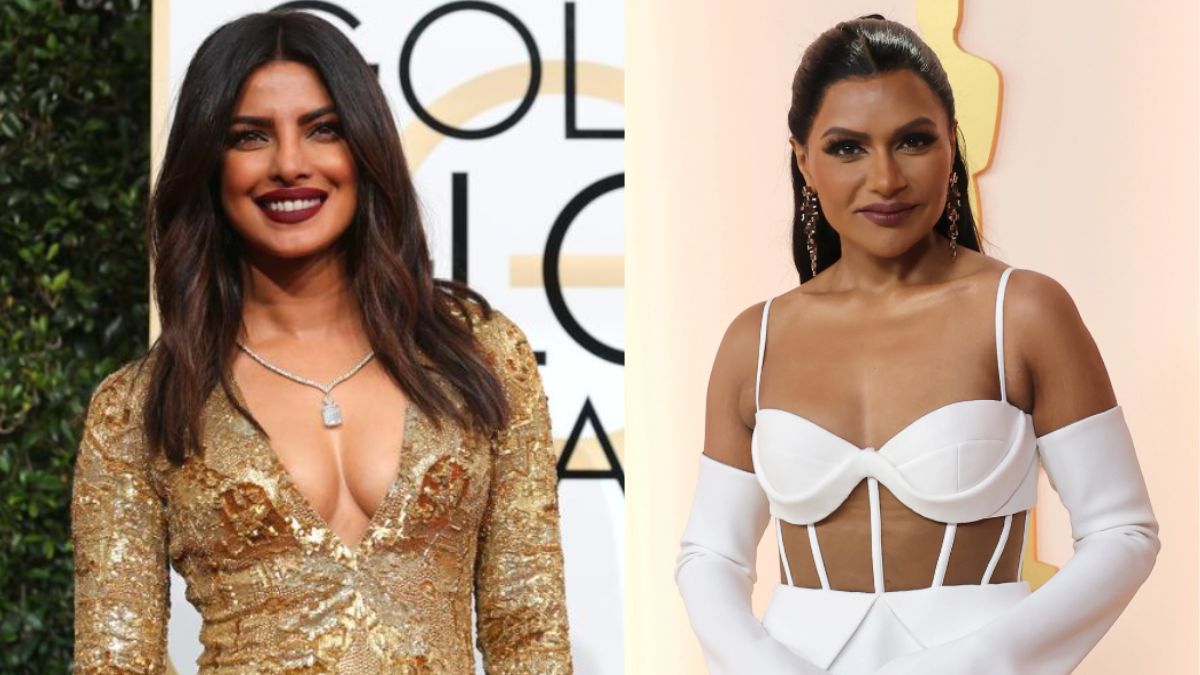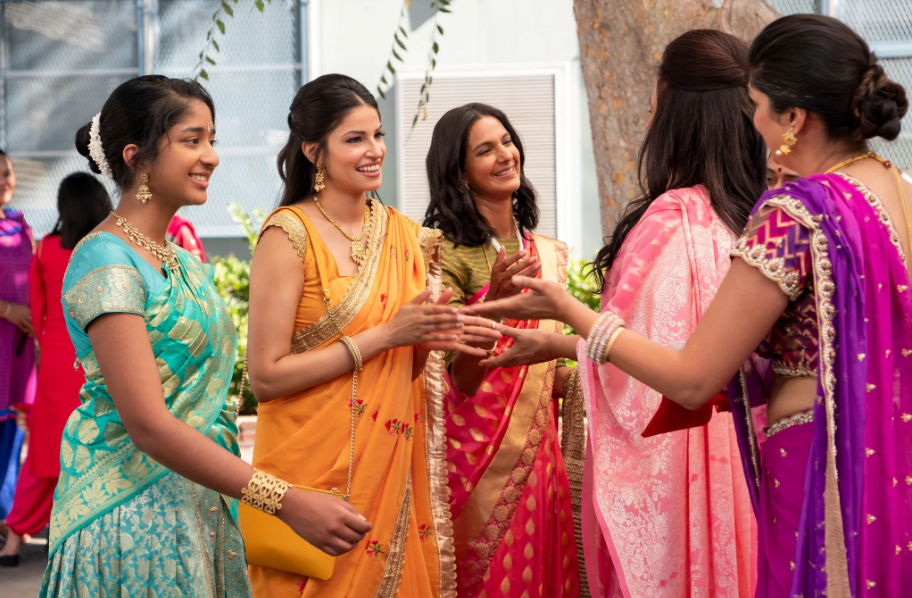- By Sukanya Saha
- Sat, 22 Apr 2023 09:25 PM (IST)
- Source:JND
For a long time, the only South Asian representation we saw in Hollywood was through the character of Apu in The Simpsons, who was voiced by a non-Indian actor and portrayed in a negative and derogatory manner. However, over the years, the representation of South Asians in Hollywood has improved with the increased popularity of films and TV shows featuring South Asian-Americans and Bollywood celebrities. Some noteworthy examples include the Harold and Kumar franchise, The Pink Panther 2, The While Tiger, Never Have I Ever, Bridgerton, Priyanka Chopra's highly anticipated action-packed series Citadel and several other films and series with South Asian leads.
In the early aughts, brown actors were mostly limited to portraying characters such as shopkeepers, IT professionals, or doctors. Although these professions were an improvement over previously stereotypical roles like snake charmers or terrorists, it was still discouraging and shameful to restrict brown talent to a specific typecasting.
Despite the fact that Indians make up 20 per cent of the world's population, our culture has often been inaccurately portrayed in popular media. It is crucial for filmmakers to acknowledge that India is not solely characterised by marigold flowers and slums; the country is also home to stunning landscapes and modern cities. Hollywood frequently depicts Mumbai's poverty-stricken slums but ignores its towering skyscrapers and historic landmarks.
'And Just Like That's Diwali Episode Debacle
Remember the controversy surrounding Carrie Bradshaw's confusion between a sari and lehenga in an episode of And Just Like That? While some were mad by her lack of knowledge about these Indian garments, others were puzzled by her floral mohawk. The conversation in the episode about cultural appropriation and arranged marriage further fuelled the debate, but many people found it unimpressive and called it lazy writing and an oversimplification of desi culture.
However, it is worth noting that the lack of cultural sensitivity in Hollywood is not solely the fault of white people as one of the four writers for the episode in question was Rachna Fruchbom, a South Asian who has previously worked on the show Fresh Off the Boat.
Can’t stop thinking about how in And Just Like That not a single thing in the “sari shop” was a sari. Cursed episode. pic.twitter.com/fAshOX6bMM
— Zara Rahim (@ZaraRahim) January 7, 2022
While it would have been better if Carrie had correctly identified the Indian garments and had knowledge of Diwali (after living in a city with prominent Diwali events held every year) before her 50s, addressing these surface-level issues would not have solved the deeper problem of tokenism.
What is Hollywood truly needs is authentic and fully developed characters and storylines that provide diverse perspectives of the South Asian experience beyond just showcasing their traditional clothing and festivals.
Nevertheless, since the early 2000s, South Asian representation in the film and television industry has evolved significantly, transitioning from stereotypical and whitewashed characters such as Kevin G in Mean Girls to more authentic depictions such as Kamala Khan in Ms. Marvel. In addition to better representation of diverse South Asian cultures, some writers have also attempted to incorporate elements of the Indian and Pakistani film industry into their productions.
How Mindy Kaling Opened Doors
The emergence of South Asian narratives has become more frequent, and Mindy Kaling of The Office has played a significant role in this. Kaling's portrayal of Kelly Kapoor, a ditzy character in the sitcom, was a departure from the typical portrayals of South Asian women as ambitious and nerdy. Her productions have opened up a window into the lives of a diverse range of Indian Americans who were once absent from American screens.
The main character of Mindy's latest project, Never Have I Ever, is an Indian American named Devi Vishwakumar, portrayed by Canadian newcomer Maitreyi Ramakrishnan. Devi faces typical teenage issues such as college applications, sex', parties, and popularity, while also grappling with the death of her father. While some have criticised the stereotypical portrayal of Devi's cultural heritage, the show has received mostly positive reviews.
(Image credit: Twitter)
In many Western mainstream television shows, South Asian women were previously only portrayed as 'sexless, sidekicks who were overly serious, or were simply shown as the mothers and sisters of South Asian men. This type of representation had a tremendous impact on how South Asian women were perceived by others through the lens of the white gaze.
While growing up, we saw that the most common story that was told about South Asian women by writers in the West was one that revolves around strict parents and the desire to assimilate into whiteness, as seen in movies like Bend It Like Beckham.
However, the available roles for South Asian actors have changed over time. For instance, characters such as Cece in New Girl and Olivia in Mindy’s Kaling's 'Sex Education, while still somewhat exoticised, are influenced by their South Asian heritage.
Additionally, a new generation of British South Asian screenwriters has emerged, such as Nida Manzoor, whose upcoming series Lady Parts features a band of Muslim women.
Priyanka Chopra On Promoting South Asian Talent In Hollywood
In 2022, while attending the South Asian Excellence event at United Talent Agency in Beverly Hills, California, Priyanka Chopra had recounted attending a Golden Globes after-party with Aziz Ansari when she first arrived in Hollywood. She said they decided, "We're going to count how many brown people are in the room. And it was just us."
However, ten years later, Chopra revealed that at the same event, she could count hundreds of people who looked like her. "Today I stand amongst peers, amongst colleagues, amongst South Asian excellence, and I have goosebumps. I'm emotional … we, after a very, very long time, have 10 nominees," she said.
Recently, during an interview with PTI, the Barfi actor revealed that she had no support when she started working in Hollywood, but now she wants to help promote talent from her home country and South Asia. She plans to become a supporter for others, as she has gained experience and success in the industry.
Therefore, she took on various initiatives to showcase the talent from India, including organising screenings of award-winning films like RRR and Chhello Show, which was India's official entry for the Oscars. She has also thrown pre-Oscars parties for South Asian talent, with the aim of highlighting the strength and influence of artists from India.
View this post on Instagram
"I feel like it is my responsibility now to be able to help people who want help from me because I didn't have it. It's always nice when you come into the industry and somebody says, 'I'll make a call for you'. I have that now with industry friends that I've built relationships with, whether that's in Bollywood or Hollywood. It feels good to be able to help people achieve their dreams," the actor-producer said.
Therefore, while there is still much progress to be made in terms of South Asian representation, notable Hollywood figures like Mindy Kaling, Maitreyi Ramakrishnan, Priyanka Chopra, and others are leading the way for a new generation of South Asian entertainers. They are bravely challenging traditional roles that South Asians are typically limited to and inspiring young people to embrace their cultural identity with confidence and pride.


